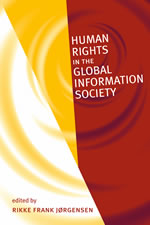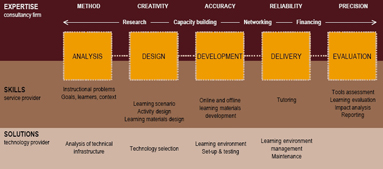By Ismael Peña-López (@ictlogist), 04 October 2006
Main categories: ICT4D, Meetings
2 Comments »
9th International Conference on Social Implications of Computers in Developing Countries
Organized by the International Federation for Information Processing, the conference presents the following Sub-Themes:
- The role of e-government initiatives in education and health, what lessons can be learned?
- What are the experiences of ICT enabled development stimulated by efforts to develop indigenous ICT industries?
- The role of cybercrime and its effects on development initiatives
- What influence has ICT initiatives on rural development?
- What are the consequences of new organisational forms enabled by ICTs for developing countries?
- ICTs and social inclusion: experiences and prospects
- What have been the consequences of implementing open source initiatives in government and in the private sector?
- What are the infrastructure and human resources factors that influence the implementation of e-development initiatives?
- Evaluating the role of international agencies in the implementation of e-development initiatives. What can be learned? What can be improved?
Conference data:
IST-Africa 2007
The goals of the IST-Africa Conference Series are Community Building to facilitate EU-African research cooperation and successful exploitation of research results, to stimulate take-up of RTD results by industry, Small and Medium Sized Businesses and the public sector, to promote knowledge sharing between commercial organizations, government agencies and the research community, to exchange experiences about the current state of eAdoption at a sectoral, national or regional level, and to support International Cooperation and open up the European Research Area (ERA) to Africa.
Core thematic priorities for IST-Africa 2007 are:
– eHealth – Services to Citizens, Technologies
– Technology Enhanced Learning & ICT Skills
– ICT for Networked Business – Future Forms of Organisations, Technology and Applications
– eGovernment & eDemocracy
Conference data:
By Ismael Peña-López (@ictlogist), 03 October 2006
Main categories: Education & e-Learning, ICT4D, Meetings
No Comments »
The 2nd International Conference on ICT for Development, Education and Training will take place at the Kenyatta International Conference Center in Nairobi, Kenya, from May 28 to 30, 2007.
The “subtitle” of the meeting is Building Infrastructures and Capacities to Reach out to the Whole of Africa, thus the list of themes is a comprehensive effort to cover all subjects around education, capacity building, e-learning, development, ICTs, open access, open source, etc.
Call for papers is open until Friday, December 8, 2006. Besides the usual presentations, other possibilities of collaboration are open too.
By Ismael Peña-López (@ictlogist), 21 September 2006
Main categories: ICT4D, Meetings
Other tags: ict4d_symposium_2006
No Comments »
By Ismael Peña-López (@ictlogist), 20 September 2006
Main categories: Cyberlaw, governance, rights, ICT4D
No Comments »

Human Rights in the
Global Information Society
The MIT Press has just published the book Human Rights in the Global Information Society, edited by Rikke Frank Jørgensen.
The table of contents really looks exciting, dividing the 12 articles or chapters in three parts: the first one related to freedom of expression, access to information and privacy protection, where so hot questions such as censorhip, data protection, the emerging media and others might be dealt with); second part about freedom of association and participation, where all the aspects of democracy and electronic democracy should be considered (the right to be informed, the right to deliberate, the right to make your own oppinions up); and a last part about equality and development, where one would expect to find e-inclusion, interculturalism and leapfrogging.
While I have not read the book yet — so I don’t know whether I’d found these words and/or the equivalent concepts — the feeling so far about the book is quite positive. And while it’s usual to read about ICTs in the field of development concerning economic issues, sometimes even social issues, but rarely strictly in the field of Human Rights, the subject is getting the more and more important as some works and some institutionshave already pointed.
By Ismael Peña-López (@ictlogist), 20 September 2006
Main categories: Education & e-Learning, ICT4D, Knowledge Management
No Comments »
Seed is a new non-profit created to foster the use of ICTs in education in cooperation and development projects. In my oppinion, the added value comes in their approach: to help in the design of ICT strategies, instead of (a) taking for granted that the project or the institution’s strategy is ok or (b) taking for granted that the western point of view of ICT strategy is the one and only, and counterparts just have to accept charity (no help, no contributions, no collaboration at all, just charity) without complaining.

Seed services [click to enlarge]
One of the members of the team is Isabella Rega, whom ICTlogy readers might already be familiar with, for she took part in the Annual ICT4D Postgraduate Symposium 2006.
By Ismael Peña-López (@ictlogist), 19 September 2006
Main categories: ICT4D
No Comments »
New ITU report on the history, state and trends of ICT development in least developed countries.
Main report conclusions:
- Teledensity has doubled (even multipliyed per 20).
- Connectivity goes mobile and cellulars increase prominence. Wireless can boost too the increase in connectivity and teledensity.
- Access and interest (i.e. e-education, e-health, e-business, e-agriculture, and e-government) in the Internet increases. ICTs look like the last train to development.
- Lack or weak policy making and regulating in the ICT arena.
- Still high cost of connectivity.
- Lack of local relevant content.
Main comments (on my side):
- What teledensity? low or broadband? It seems it’s just “lines”. But, are these “lines” worth the name of connectivity when the world goes broadband demanding?
- It seems like (for the first time, at least being I aware of this) ITU is focusing new strategies not only to infrastructures development but also to e-services, which is definitely good news.
- Same with regulation. On the other side, I wonder this will mean free market at whatever price. I wonder if mixed formulae (public ownership of infrastrucures, free market for apps and services) will be considered: there are many examples where private ownerwship of infrastructure has lead to (a) de facto monopolies and/or (b) sub-optimal investment in infrastructures.
- It looks like is trendy and hypy to talk about ICTs for disaster prevention (just remember Katrina and Indonesia tsunami), but it is still not that trendy to talk about ICT for capacitation, human capital, self-entrepreneurship and other endogenous development concepts.
- No mention to free software (infrastructure) or open access (content) paradigms. I just cannot believe it. Completely astonished.
The report:
[via Telconomics, ITU and i4d]



 ICT/Telecommunication development in least developed countries. Mid-term Review for the Decade 2001-2010
ICT/Telecommunication development in least developed countries. Mid-term Review for the Decade 2001-2010